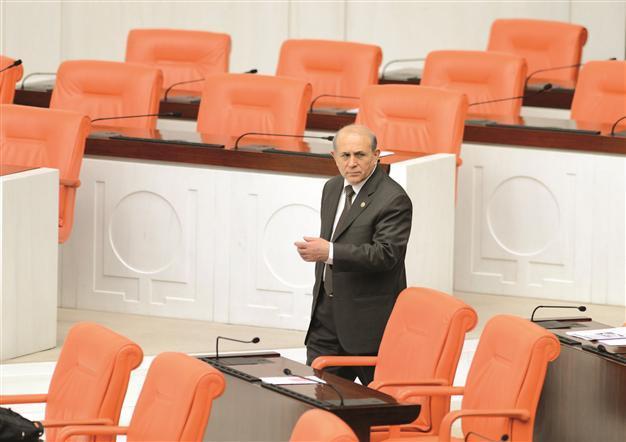Deputy PM rebuffs calls for new charter deadline
ANKARA - Hürriyet Daily News

Burhan Kuzu, the head of Parliament’s Constitution Conciliation Commission, is seen at the Parliament building. Daily News photo by Selahattin SÖNMEZ
The ruling party has rejected the Parliament Speaker’s proposal of further extending the mandate of the commission tasked to rewrite the Constitution, reiterating its readiness to introduce self-drafted text if the Parliament body fails to produce a joint charter before the end of March.“The Constitution Conciliation Commission had declared that it will introduce the new Constitution draft to the people by Dec. 31, 2012. Although its term was expired, it could not produce such a result. As a result of the initiative of the Parliament Speaker, an additional three months were given to the commission. Our wish is that the commission will introduce the new Constitution draft within this (three months) time,” Deputy Prime Minister Bekir Bozdağ told reporters on Feb. 8 before the ruling Justice and Development Party’s (AKP) weekly meeting. The meeting was chaired by Prime Minister Recep Tayyip Erdoğan.
“If such a result is obtained, this would be in the interest of Turkey,” he said, stressing that the party was seeking a consensus with the three other parties represented in Parliament.
A four-party commission continues the writing process of the new charter but is advancing at a snail’s pace due to deep disagreements between parties over a number of issues, including amending the administrative structure of Turkey to the presidential system. The commission could agree on around 30 articles out of 88 and completing the process by the end of March seems unlikely. Parliament Speaker Cemil Çiçek, who exerted great efforts on the new Constitution, hinted that the commission would need some more time after March in a bid not to leave the process unfinished. But Erdoğan had previously signaled that prolonging the process would be impossible given the fact that Turkey will see three consecutive elections starting March 2014.
Bozdağ noted that the completion of the mandate would not remove the need for a new Constitution in Turkey and therefore politics will continue to heed the demands of the people to this end. “Parliament will address this one way or another. What we say is if a consensus based on four parties cannot be reached, then we’ll come to an agreement with two parties. If not, then we’ll do it with one party and take our steps accordingly,” he stressed.
Bozdağ vowed that they will not remain uninterested if they can find enough support to adopt the new Constitution in Parliament. With its 325 votes in Parliament, the AKP still needs at least five votes to take the drafted charter to a referendum, which requires a two-third majority for adoption without popular approval. The AKP can make alliances either with the Nationalist Movement Party (MHP) or the Republican People’s Party (CHP) for the new charter as their support would fill 367 votes. Bozdağ noted that they will continue to seek an agreement with the parties until March and did not respond to questions on which party they would seek a partnership with on the new charter.
Çiçek: Let’s talk at the end of March
Çiçek, however, refused to comment on what would happen if the commission fails to produce a text before the end of March. “Everybody is talking about the end of March. Let’s all work hard until the end of March and let’s multiply the number of agreed articles. Don’t ask me that picture now but on March 28, March 30. Talking about the future today is not right for those who are working in the commission,” Çiçek said in an interview with CNNTürk TV.
Çiçek’s plan is to be able to complete the writing process of a good majority of the articles before the end of March so that parties will extend the commission’s mandate. “What we have to do now is to work harder without considering time constraints,” he stated.
Bozdağ refutes criticism over judicial structure proposal
The opposition parties have criticized the ruling party for hindering the work of the commission by proposing the presidential system and restructuring the higher judiciary. The government’s recent proposal to abolish existing bodies of supreme courts under a single court of cassation drew reactions from the opposition, who found the move undemocratic and motivated by Erdoğan’s future plans for the presidency. According to the plan, the majority of judges and prosecutors to be tasked in the new supreme judiciary will be appointed by the President and Parliament.
“When they are elected by the votes of judges [under the current system], it’s democratic. Why is it undemocratic when they are elected by Parliament? Why is it undemocratic when they are selected by the President? What we actually aim to realize is a more democratic structure,” Bozdağ argued.
Noting that similar systems are implemented in some other democratic countries as well, Bozdağ asked, “Why are they afraid of Parliament’s election [of judges]? Why do they hesitate over the election of judges by the President, who would be elected by 51 percent of the people’s vote?”
















